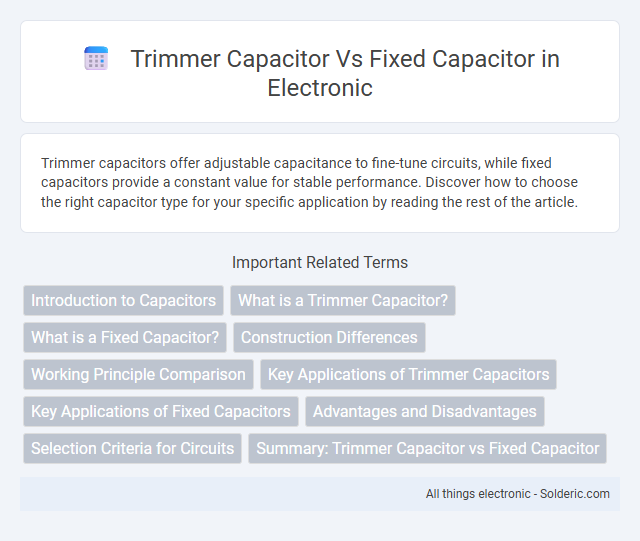Trimmer capacitors offer adjustable capacitance to fine-tune circuits, while fixed capacitors provide a constant value for stable performance. Discover how to choose the right capacitor type for your specific application by reading the rest of the article.
Comparison Table
| Feature | Trimmer Capacitor | Fixed Capacitor |
|---|---|---|
| Definition | Adjustable capacitor for fine-tuning circuit parameters. | Non-adjustable capacitor with a fixed capacitance value. |
| Capacitance Range | Typically small, from a few pF to hundreds of pF. | Wide range, from pF to several uF or higher. |
| Adjustment | Manually adjustable using a screw or dial. | No adjustment; value is constant. |
| Applications | Circuit tuning, calibration, RF circuits. | Filtering, timing, energy storage in electronic circuits. |
| Size | Compact, small footprint. | Varies; generally larger in capacitance range. |
| Cost | Higher cost due to adjustability. | Lower cost, mass-produced in large quantities. |
| Stability | Less stable; capacitance can drift with vibration or temperature. | More stable and reliable. |
Introduction to Capacitors
Capacitors store electrical energy by separating charges on conductive plates, with fixed capacitors offering a constant capacitance value ideal for stable circuit designs, while trimmer capacitors provide adjustable capacitance for fine-tuning and calibration. Fixed capacitors are commonly used in applications requiring reliability and minimal variation, such as filtering and timing circuits. Your choice between trimmer and fixed capacitors depends on whether precision tuning or consistent performance is needed in your electronic project.
What is a Trimmer Capacitor?
A trimmer capacitor is a small adjustable capacitor used to fine-tune circuit capacitance for optimal performance, often found in RF circuits and calibration applications. Unlike fixed capacitors with a set capacitance value, trimmer capacitors allow precise manual adjustment through a screw or dial, enabling exact tuning during circuit assembly or maintenance. This adjustability makes trimmer capacitors essential in frequency-sensitive devices such as radios, oscillators, and transmitters.
What is a Fixed Capacitor?
A fixed capacitor is an electronic component with a set capacitance value that cannot be adjusted after manufacturing, commonly used in circuits requiring stable and precise capacitance. It offers consistent performance in filtering, timing, and energy storage applications, ensuring reliability in your electronic designs. Unlike trimmer capacitors, fixed capacitors provide minimal variability and are ideal for fixed-value capacitor requirements.
Construction Differences
Trimmer capacitors feature adjustable plates housed within a small dielectric-filled enclosure, allowing precise capacitance tuning by manual rotation of a screw or dial. Fixed capacitors consist of rigid dielectric materials sandwiched between stationary conductive electrodes, providing stable and unchangeable capacitance values. The key construction difference lies in the variable spacing and overlap of plates in trimmer capacitors versus the permanent structural arrangement of plates in fixed capacitors.
Working Principle Comparison
Trimmer capacitors operate by adjusting the distance between their plates or changing the dielectric material, allowing fine-tuning of capacitance for precise circuit calibration. Fixed capacitors have a set capacitance value determined by their fixed plate area and dielectric properties, offering stability but no adjustability. Your choice depends on whether you need precise tuning or consistent capacitance in your electronic design.
Key Applications of Trimmer Capacitors
Trimmer capacitors are primarily used in fine-tuning circuits, such as RF filters, oscillators, and antenna matching networks, where precise capacitance adjustment is crucial. Their adjustable nature makes them ideal for calibration tasks in communication equipment and microwave devices, optimizing performance by compensating for component tolerances and environmental changes. Fixed capacitors, in contrast, provide stable capacitance for general filtering, DC blocking, and energy storage in most electronic circuits without requiring adjustment.
Key Applications of Fixed Capacitors
Fixed capacitors are widely used in power supply filtering, signal coupling, and decoupling applications, ensuring stable voltage levels and noise reduction in electronic circuits. Their consistent capacitance values make them ideal for timing circuits, oscillators, and frequency tuning in RF devices. You will find fixed capacitors essential in power electronics, audio equipment, and communication systems where precise and reliable performance is critical.
Advantages and Disadvantages
Trimmer capacitors offer precise capacitance adjustments, making them ideal for fine-tuning circuits and optimizing performance, but they tend to be more expensive and less stable over time compared to fixed capacitors. Fixed capacitors provide reliable, consistent capacitance values with higher stability and lower cost, but lack the flexibility for post-installation tuning. Your choice between trimmer and fixed capacitors depends on the need for adjustability versus the demand for stability and cost-efficiency in your application.
Selection Criteria for Circuits
Selection criteria for circuits emphasize the adjustable capacitance of trimmer capacitors, which allows for fine-tuning and calibration in high-frequency or precision applications. Fixed capacitors provide stable and reliable capacitance values suitable for general-purpose filtering, coupling, and timing circuits where consistency is critical. Designers choose trimmer capacitors for prototyping and adjustment, while fixed capacitors are preferred for mass production with fixed specifications.
Summary: Trimmer Capacitor vs Fixed Capacitor
Trimmer capacitors offer adjustable capacitance, allowing precise tuning in circuits for optimized performance, whereas fixed capacitors provide stable, non-adjustable capacitance values suited for consistent operation. Trimmer capacitors are commonly used in RF circuits and calibration tasks, while fixed capacitors are preferred for general-purpose filtering, coupling, and decoupling applications. The choice between trimmer and fixed capacitors depends on the need for variability versus stability in capacitance within electronic designs.
Trimmer Capacitor vs Fixed Capacitor Infographic

 solderic.com
solderic.com